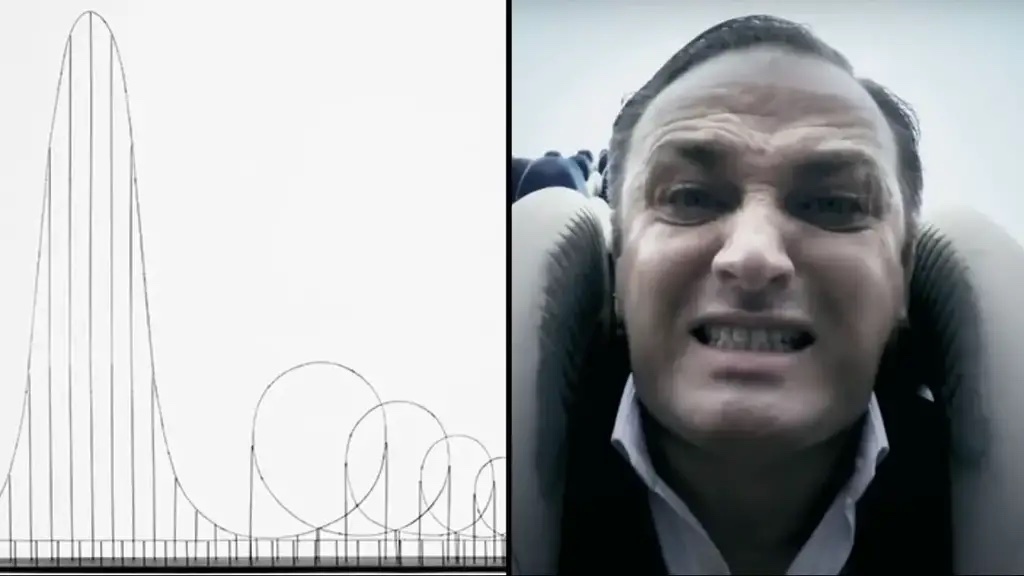A man has designed a ‘euthanasia rollercoaster’ that ensures that those who ride it will not survive the experience.
Euthanasia is the practice of intentionally ending life to eliminate pain and suffering, with different countries having differing laws on the matter.
The topic has always been a divisive issue.
But now, a controversial design for a euthanasia rollercoaster has sparked online debate.
A man has come up with an unconventional method for euthanasia that offers a final, dramatic experience.
The ‘euthanasia coaster’ employs a technique that’s supposed to be ‘more humane’ than simply launching riders off the tracks — although calling a death coaster ‘humane’ is a stretch.
So, what method does this rollercoaster use if it doesn’t catapult passengers into the distance?
The answer is quite unsettling.

Julijonas Urbonas is an individual with an impressive background, as detailed on his website.
He’s an artist, designer, researcher, and engineer, founder of the Lithuanian Space Agency, associate professor at Vilnius Academy of Arts, and former Director of a Soviet amusement park in Klaipeda.
And his design is certainly a controversial one.
The Euthanasia Coaster is a concept for a steel roller coaster designed to kill its passengers.
Discussing his design, Urbonas explained: “Euthanasia Coaster (2010) is a hypothetical death machine in the form of a roller coaster, engineered to humanely – with elegance and euphoria – take the life of a human being.
“Riding the coaster’s track, the rider is subjected to a series of intensive motion elements that induce various unique experiences: from euphoria to thrill, and from tunnel vision to loss of consciousness, and, eventually, death.”
The key term here is ‘hypothetical,’ indicating that the coaster is a theoretical construct rather than a real, operational ride.
Urbonas states to Arterritory: “I would consider the coaster… neither unreal nor real, but somewhere in between.”
He has also noted that he has a list of individuals interested in experiencing the ride if it were ever realized, mostly elderly individuals from the U.S., though he does not intend to pursue this further.
His hypothetical creation aims to explore extreme experiences of gravity and the body’s limits.
Regarding his personal view on euthanasia, Urbonas has stated: “I want to stress that I do not encourage assisted suicide, nor do I discourage. I just state the fact that euthanasia is legal in some countries and it is executed in an extremely boring fashion, proposing ‘humane’ voluntary death could be more meaningful, personal, ritualistic.”

The ride begins with a steep drop, followed by several increasingly tighter loops.
Describing the coaster, Davidson says: “You can only experience this roller coaster once.
“Designed by Julijonas Urbonas, the Euthanasia Coaster can accommodate up to 24 passengers. After boarding, the coaster slowly ascends to a height of 510 meters—slightly shorter than the tallest building in the U.S.”
He continues: “Once at the top, riders are given the option to stop and return safely. If they choose to proceed, they must manually start the ride.”
What happens next?
Davidson explains: “The coaster then plummets at 223 miles per hour through seven loops that progressively decrease in size.”

The ride’s intensity builds until the passengers lose consciousness from the extreme forces and ultimately pass away.
Davidson details: “The coaster’s track subjects riders to intense G-forces, resulting in a range of sensations from euphoria to thrill, tunnel vision, and eventually loss of consciousness, culminating in death.”
So, what causes the fatal outcome?
He states: “The primary cause of death is cerebral suffocation, or cerebral hypoxia, where the brain is deprived of oxygen.
“The ride continues until the body is fully numb, ensuring that death occurs. Essentially, the brain dies from lack of oxygen, which is legally recognized as death in many places.”
Even more terrifyingly, someone has created a visual simulation of what would happen if you were to ride the controversial coaster.
Until recently, the only visualizations available were diagrams and descriptive texts.
However, now there’s a realistic simulation that places viewers in the front seat of this fictional ride.
This coaster, which earned the Public Prize of New Technological Art at Update 2013, has become a notable media phenomenon since its introduction.

If you or someone you know is affected by any of the issues raised in this story, call the National S**cide Prevention Lifeline in the U.S.A. at 800-273-TALK (8255) or text Crisis Text Line at 741741.
In the UK, the Samaritans are available 24/7 if you need to talk. You can contact them for free by calling 116 123, emailing [email protected], or heading to the website to find your nearest branch.
